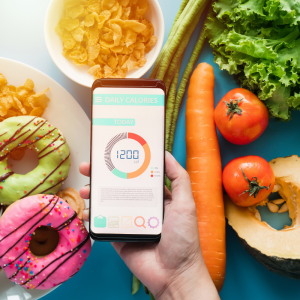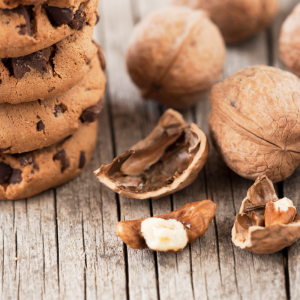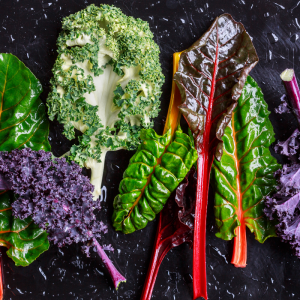 You might not expect to hear this from a nutritionist, but I ask my clients not to count calories. Why is that, you might wonder. After all, isn’t consuming fewer calories than you expend the magic formula for weight loss? Well, it isn’t quite that simple. For one, it is very difficult to accurately measure the calories we consume and expend. But what’s more important is that counting calories puts the focus in the wrong place. Because it isn’t so much the amount of calories in a food but what your body does with the food that counts. And, in that respect, foods of equal calories are not necessarily equal.
You might not expect to hear this from a nutritionist, but I ask my clients not to count calories. Why is that, you might wonder. After all, isn’t consuming fewer calories than you expend the magic formula for weight loss? Well, it isn’t quite that simple. For one, it is very difficult to accurately measure the calories we consume and expend. But what’s more important is that counting calories puts the focus in the wrong place. Because it isn’t so much the amount of calories in a food but what your body does with the food that counts. And, in that respect, foods of equal calories are not necessarily equal.
Just as no two people are the same. Two people eating exactly the same food will extract different caloric value from it. This is due to the complex interaction between the food (and how it’s prepared or processed), the intricacies of our own body’s digestive system and processes and the composition of our gut microbes. Even identical twins may metabolize the same foods somewhat differently, as their gut microbes may differ. If all this intrigues you, you might enjoy reading this article. So, rather than count calories, I’d rather focus on making calories count.
Counting calories isn’t worth the time and effort
Even if the calorie labels on food were accurate (which they may not be, with manufacturers legally allowed error rates of up to 20%), it is terribly impractical to count calories. The more accurate you try to be, the more irritatingly time-consuming it becomes. As Tim Spector put it in Spoon-Fed, “Even trained dieticians with obsessive traits find it impossible to live a normal life and count to within 10% the calories they ingest.” In short, it’s no fun whatsoever, which also makes it an unsustainable practice.
And it can backfire. For some, it tends to encourage greater consumption of commercially prepared foods, which are not as healthy as their homemade versions. After all, it’s a whole lot easier to count calories when you can read directly off the label to log “PC Meat Lasagna – 350 calories per quarter tray”, as compared to logging the calories of each and every ingredient in your own homemade lasagna and then estimating the calories of one portion. Calorie counting may also trigger, maintain or even worsen eating disorders.
And, as I already mentioned, the amount of calories you actually extract from a food could very well differ from what you estimate based on the label or individual ingredient tallies anyway. So you are far better off reallocating the time spent counting calories to preparing your own food from fresh, whole ingredients.
Weight gain has more do to with hormone imbalance than calorie imbalance
A complex interplay of hormones influences whether we gain or lose weight and where in our bodies we store fat. Insulin, glucagon, leptin, ghrelin, cortisol, estrogen and the various thyroid hormones are just a few that come to mind. So to say that to lose weight you just need to eat fewer calories and expend more energy is vastly oversimplifying things. Especially as not all calories are equal in how they effect the body.
Think of the food you eat as issuing hormonal instructions
When we consume food, the food stimulates the release of various hormones (chemical messengers) which issue instructions to our bodies. Different foods issue different hormonal instructions. Virtually all food stimulates the release of insulin, for example. I talked about it quite a bit in my recent post, Sliding Down a Sugary, Slippery Slope.
Essentially, insulin is a hormone your pancreas releases to move glucose (sugar) from your bloodstream into your cells. It also directs excess sugar to be stored as glycogen (in the liver or muscles) or as fat. Different foods vary widely in how much insulin they stimulate, however. The more sugar that a food releases into the bloodstream at a given time, the more insulin is required to deal with it.
Carbohydrate foods stimulate insulin to a much greater extent than fats, for example. Carbohydrates are the sugars, starches and fibres found in fruits, vegetables, legumes, grains and dairy products. Carbohydrates in their complex form (whole fruits and vegetables, whole grains and so forth) take longer to digest and turn to sugar in the bloodstream than do simple carbohydrates (like refined sugar and flour products or fruit juices). While all carbohydrates will stimulate the release of insulin, simple carbohydrates will cause the biggest insulin rush of all. But as only a miniscule portion of each fat molecule can be used as glucose for energy, fat doesn’t have much impact on blood glucose levels or insulin release. Protein lies in between with regards to its insulin effect.
The best choice isn’t necessarily the lower calorie choice
So a calorie is not a calorie in its effect in the body; 100 calories (about 5 teaspoons) of refined sugar will result in a much larger release of insulin than will 100 calories (about 2.5 teaspoons) of olive oil, for example.
Consider these two snack choices:
 one PC Decadent Chocolate Chip Cookie has 85 calories, 6.5 grams of sugar, 0.5 grams of fibre, 4 grams of fat and 1 gram of protein
one PC Decadent Chocolate Chip Cookie has 85 calories, 6.5 grams of sugar, 0.5 grams of fibre, 4 grams of fat and 1 gram of protein- a one-ounce serving of walnuts (about 14 halves) has 185 calories, 0.7 grams of sugar, 1.9 grams of fibre, 18.5 grams of fat* and 4.9 grams of protein
[*Interestingly, this 2020 study found that only about 75% to 80% of the fat contained in nuts (walnuts, almonds, pistachios) is released when we eat them. So their calorie counts have been overstated for years. And the amount of calories you actually ingest is further reduced by their fibre content, as soluble fibre is fermented by our gut bugs, providing us with a little energy, and we don’t metabolize insoluble fibre at all.]
If you were to choose the cookie over the walnuts because the cookie has less calories and fat (and, therefore, must be less fattening), it would be a big, fat mistake as the cookie will stimulate much more insulin. And not only does insulin regulate fat storage, it actively inhibits fat from being burned.
It’s not all about insulin
And it isn’t all about insulin either. Take fats, for example, which tend to have very little insulin effect. All fats are 9 calories per gram. But omega-3 fats are both heart-healthy and essential to the body whereas trans-fats will clog your arteries and hasten your demise.
What about protein? Well, it takes twice as much energy to metabolize protein than carbohydrates. So more of the calories in protein are immediately expended by your body metabolizing it. And as it is more satisfying, the calories in protein will keep you full longer and so less likely to overeat.
And fibre? The calories in insoluble fibre pass right through us without being metabolized or absorbed. And our gut bugs digest the insoluble fibre, producing short-chain fatty acids that provide about 2 calories per gram of energy for our use (rather than the 4 typical of carbohydrates). It is super important to feed and foster a diverse variety of beneficial species in your gut. An imbalance, where harmful species predominate, may increase the risk of obesity, type 2 diabetes, allergies, anxiety, inflammatory bowel disease, anxiety and more.
Even when it comes to the various types of sugar, the body metabolizes them quite differently. Glucose is metabolized widely in the body, whereas fructose is almost entirely metabolized in the liver. But it is the calories from added sugar that are especially detrimental to our health. Consider this study, for example, performed by Robert Lustig, MD and colleagues. He summarizes that “total caloric availability was unrelated to diabetes prevalence; for every extra 150 calories per day, diabetes prevalence rose by only 0.1 percent. But if those 150 calories were from added sugar, diabetes prevalence rose 11-fold, by 1.1 percent.”
These are just a few examples but they help illustrate how counting calories is not a particularly useful approach when it comes to healthy eating and weight loss.
Make calories count
Instead, it is more important to make your calories count. Ask yourself, what is your food doing for you?
- Is it providing the nutrients you need to thrive?
- Is it giving you the sustained energy you desire?
- Are your meals satisfying and enjoyable?
These are far more important considerations than the number of calories you are eating. And there are many foods out there that offer a big nutrient bang for your calorie buck.
Nutrients include both macronutrients (carbohydrates, protein and fat) and micronutrients (the vitamins, minerals and phytonutrients found in these foods). Our western diet is full of processed foods which tend to be high in calories yet offer very little in the way of quantity or diversity of micronutrients. Which is why so many people suffer from the seeming paradox of being both overweight and undernourished.
As you can see, healthy eating goes beyond counting/limiting calories. You need to consider what your body will do with the food you eat and whether it provides the necessary micronutrients. After all, as Dr. Joel Fuhrman put it so well, “micronutrients fuel proper functioning of the immune system and enable the detoxification and cellular repair mechanisms that protect us from chronic diseases.” So let’s make our calories count!
Focus on nutrient-dense foods
Dr. Fuhrman developed a very handy index called the Aggregate Nutrient Density Index (ANDI). His index ranks the nutrient value of many common foods on the basis of how many nutrients they deliver to your body for each calorie consumed. The scale is from 1 to 1000, with the most nutrient-dense foods scoring 1000. Here is how many common foods stacked up.
 What I love about his chart is that it highlights beautifully how important veggies are to a healthy diet. They are brimming with healthy micronutrients for ridiculously few calories. And their high fibre content makes them both very filling and slow digesting (thus reducing the amount of insulin required). So, go crazy, eat tonnes of these non-starchy vegetables and don’t bother to count your calories. It is virtually impossible to overdo it on kale (in five-way tie for top ranking at 1000).
What I love about his chart is that it highlights beautifully how important veggies are to a healthy diet. They are brimming with healthy micronutrients for ridiculously few calories. And their high fibre content makes them both very filling and slow digesting (thus reducing the amount of insulin required). So, go crazy, eat tonnes of these non-starchy vegetables and don’t bother to count your calories. It is virtually impossible to overdo it on kale (in five-way tie for top ranking at 1000).
Foods that rank lower on the index are also healthy foods. Consider salmon (at 34). Being a fatty fish, it is fairly high in calories relative to its nutrient content. But it is a rich source of essential fatty acids, B vitamins and minerals like potassium and selenium. So by all means have a healthy portion of salmon too, just be sure to balance out your meal with lots of nutrient-dense vegetables as well.
When you consume foods with the nutrients you need in the quantity your body requires to function optimally, your appetite will be satisfied. Your meals will provide you with sustained energy. And you won’t suffer from hunger pangs and cravings (at least not for physiological reasons). No calorie counting required.
Beware inflammatory foods
 Just as some foods provide hormonal instructions and nutrients that are favourable to both healthy weight and healthy function, other foods can do the opposite and set off a cascade of inflammatory reactions. Refined carbs (like sugar and refined flours) and fried foods are good examples. Inflammatory foods can increase our stress hormone, cortisol. And higher cortisol levels can lead to our cells becoming resistant to insulin. This may, in turn, lead to an increase in blood sugar and weight gain. And excess body fat is not inert. It can produce all kinds of chemicals and proteins, including certain inflammatory cytokines. So it can be a rather vicious cycle, with inflammatory foods leading to weight gain and then the added weight further increasing inflammation.
Just as some foods provide hormonal instructions and nutrients that are favourable to both healthy weight and healthy function, other foods can do the opposite and set off a cascade of inflammatory reactions. Refined carbs (like sugar and refined flours) and fried foods are good examples. Inflammatory foods can increase our stress hormone, cortisol. And higher cortisol levels can lead to our cells becoming resistant to insulin. This may, in turn, lead to an increase in blood sugar and weight gain. And excess body fat is not inert. It can produce all kinds of chemicals and proteins, including certain inflammatory cytokines. So it can be a rather vicious cycle, with inflammatory foods leading to weight gain and then the added weight further increasing inflammation.
Quality counts more than calories
Part of the reason so many processed foods are so unhealthy is because they use poor quality ingredients. The top priority for food processors is the bottom line. Refined sugars, poor quality oils and salt are inexpensive and they provide a flavour-boost that helps mask the fact that the ingredients are often lower quality. And refined carbs like white rice, potatoes or pasta are a cheap way to fill you up. Certainly they are far less expensive than providing you with the proper amount of high quality protein, healthy fats and vegetables to make a balanced meal.
This is why it isn’t a great idea to rely on prepared or takeout foods. I recognize they are a convenience, however. So when you opt for ordering in or buying something ready-made, I suggest you take the extra few minutes to prepare some simple vegetables to provide a healthier balance. It will stretch your purchased meal further without stretching your waistline as much. Nor will it put as much of a strain on your health.
Forget calories and focus on whole foods – your body will thank you
I hope I’ve convinced you that, rather than counting calories, you are far better off cooking well balanced meals focused on whole foods and a lot of high fibre veggies (with a good drizzle of quality olive oil on them to help you extract those important fat-soluble micronutrients). Your body will thank you.